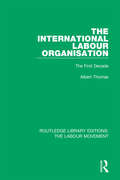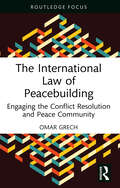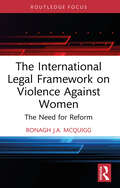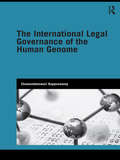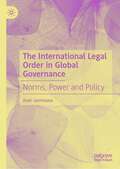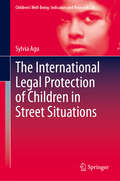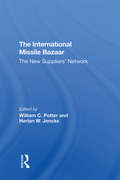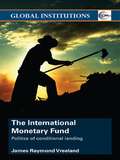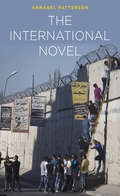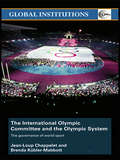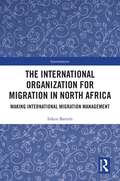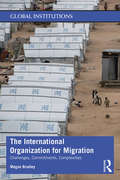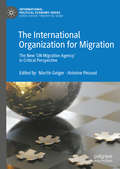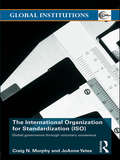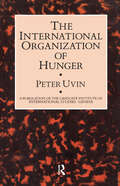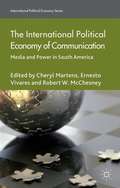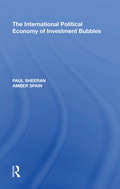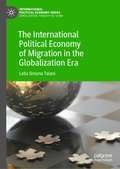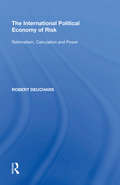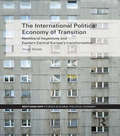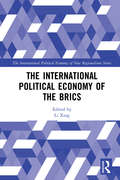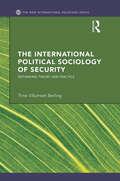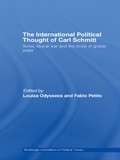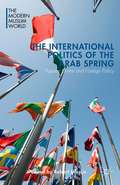- Table View
- List View
The International Labour Organisation: The First Decade (Routledge Library Editions: The Labour Movement #40)
by Albert ThomasFirst published in 1931. This study was written by various officials of the International Labour Office, and provides an overview of the work of this institution as it was in the years after its initial formation. The authors provide a full and systematic description of the activities within the organisation, and will be of great interest to scholars and students of political and labour history.
The International Law of Migrant Smuggling
by Anne T. Gallagher AO Fiona DavidWhether forced into relocation by fear of persecution, civil war, or humanitarian crisis, or pulled toward the prospect of better economic opportunities, more people are on the move than ever before. Opportunities for lawful entry into preferred destinations are decreasing rapidly, creating demand for a range of services that is increasingly being met by migrant smugglers: individuals or criminal groups who facilitate unauthorized entry into in another country for profit. This book, a companion volume to the award-winning The International Law of Human Trafficking, presents the first-ever comprehensive and in-depth analysis of the international law of migrant smuggling. The authors call on their direct experience of working with the United Nations to chart the development of new international laws and to link these specialist rules to other relevant areas of international law, including law of the sea, human rights law, and international refugee law. Through this analysis, the authors identify and explain the major legal obligations of States with respect to migrant smuggling, including those related to criminalization, interdiction and rescue at sea, protection, prevention, detention, and return.
The International Law of Peacebuilding: Engaging the Conflict Resolution and Peace Community (Studies in Conflict, Development and Peacebuilding)
by Omar GrechThis book contributes to the debate on the international law of post-conflict peacebuilding and suggests a need for closer connections between practitioners and lawyers.The work argues that significant benefits accrue when lawyers and conflict/peace practitioners, and scholars work with each other to develop a normative framework for building peace. It also attempts to bridge the divisions that exist between lawyers and the conflict resolution/peace community in the specific context of the international law of post-conflict peacebuilding. After introducing the key concepts of the international law of peacebuilding, the book explores aspects of the relationship between lawyers and peacebuilding practitioners and offers ideas about how this relationship might be improved. It then proceeds to identify some principles and processes developed by conflict resolution specialists that may inform and influence discrete parts of the international law of peacebuilding. The work concludes by identifying sites and ways in which international lawyers and conflict resolution/peace specialists may engage with each other to shape this branch of international law.This book will be of much interest to students of peace and conflict studies, international law and International Relations.
The International Legal Framework on Violence Against Women: The Need for Reform (Routledge Research in Human Rights Law)
by Ronagh J.A. McQuiggThis book provides in-depth critical analysis of the international legal framework on violence against women and, crucially, the need for reform of this framework. Violence against women occurs in every state worldwide and constitutes one of the most prevalent human rights abuses at the global level. However, none of the UN treaties refer specifically to violence against women. The book argues that there is a pressing need for legally binding provisions to be adopted at the global level on this issue. Two forms which such provisions could take are considered. These are, firstly, an Optional Protocol to the UN Convention on the Elimination of All Forms of Discrimination Against Women; and secondly, a stand-alone UN treaty on violence against women. The book’s intended audience includes academics and researchers from a wide variety of disciplines, such as human rights, international law, criminal law, criminology, social policy, gender studies and sociology; as well as practitioners and those in the voluntary sector who are working in the area of combating violence against women. The book could also be used beneficially on courses at both undergraduate and postgraduate levels which incorporate the topic of violence against women.
The International Legal Governance of the Human Genome (Genetics and Society)
by Chamundeeswari KuppuswamyThe human genome is a well known symbol of scientific and technological progress in the twenty-first century. However, concerns about the exacerbation of inequalities between the rich and the poor, the developing and the developed states, the healthy and the unhealthy are causing problems for the progress of scientific research. The international community is moving towards a human rights approach in addressing these concerns. Such an approach will be piecemeal and ineffective so long as fundamental issues about economic, social and cultural rights, the so-called second generation of human rights, are not addressed. This book argues that, in order to be able to meaningfully apply a human rights framework to the governance of the human genome, the international human rights framework should be based on a unified theory of human rights where the distinction between positive and negative rights is set aside. The book constructs a common heritage concept with the right to development at its core and explores the content of the right to development through rational human rights theory. It is argued that the notion of property rights in the human genome should be placed within the context of protecting human rights, including the right to development. The concept of common heritage of humanity, contrary to the widely held belief that it is in opposition to patenting of gene sequences, supports human rights-based conceptions of property rights. This book fills a gap in the literature on international legal governance of the human genome will provide an essential reference point for research into the right to development, development issues in bioethics, the role of international institutions in law making and research governance.
The International Legal Order in Global Governance: Norms, Power and Policy
by Alain GermeauxThe space occupied by international law in shaping political action is subject to continuing debate and controversy. This book aims to answer the question of how and why international law impacts the behaviour of actors on the international stage in the absence of central authority and faced with asymmetric power. At a time when the role of normative restraints in international relations, and international law in particular, has come under renewed questioning, it advances an analytical framework for understanding the effect of norms on behaviour that is not contingent on material restraints or a given political constellation, while being informed by the practical realities and practice of international organisation. In doing so, this book draws on an interdisciplinary range of sources, including international law, political theory, cognitive psychology and behavioural economics to explore a communicative action-based approach of how norms and ideas persuade actors to engage in a course of action consonant with international law to achieve a particular outcome. In probing the role of norms on questions such as the use of force and accountability, and issues of equity and justice, it examines the challenges international law faces and what the way forward may look like.
The International Legal Protection of Children in Street Situations (Children’s Well-Being: Indicators and Research #29)
by Sylvia AguThe book conducts a comprehensive analysis of codified international legal instruments and documents in their application to children in street situations, employing soft law documents to elucidate treaty interpretation and supplement existing legal standards. The research adopts a holistic approach, correlating international legal instruments with root causes and consequences for children in street situations, while systematically examining issues of intersectionality, such as economic, social, and cultural rights, civil and political rights, minority rights including disability rights, rights of the girl-child, as well as LGBTQI+ and migrant rights, reparations, impact of violence, and access to essential services like health, food, and housing, with various human rights issues, including economic, social, cultural, and civil-political rights. It presents the plight of children in street situations as a human rights concern, offering guidance on utilising international legal sources in rights claims procedures. The study also integrates sociological and political perspectives with legal and governmental policy issues, examining the influence of external factors such as conditional lending and structural adjustment programmes, wars, and decolonisation on social policies and their consequent impact on children and families by rendering children in street situations 'visible' as a distinct category requiring urgent attention in State policy formulation. By systematically integrating international legal instruments with practical policy considerations and applications concerning children in street situations, this scholarly work serves as a comprehensive legal framework for State governments, their bodies and social workers, and a valuable advocacy guide for interest groups including non-governmental organisations, proposing future directions for policy and research for addressing the rights and needs of children in street situations.
The International Missile Bazaar: The New Suppliers' Network
by William C Potter Harlan W JencksInternational experts examine transactions, capabilities, structures and norms influencing the complex network of trade in missile technologies.
The International Monetary Fund: Politics of Conditional Lending (Global Institutions)
by James Raymond VreelandThis is a clear and concise introduction to the International Monetary Fund (IMF) and an overview of its debates and controversies. Where did the IMF come from? What does it do? Why do so many governments participate in its programs and what are their effects? How can we best reform this key global institution? These are some of the key questions addressed. In our age of thinking global, the IMF is a crucial institution and central to understanding international relations and current affairs. Founded in the aftermath of the Second World War, its basic purposes were to facilitate world trade and promote national prosperity. The founders hoped that never again would the world experience the trade policies that led up to the Great Depression. This book outlines and questions these targets and assesses actual achievements. It also details how despite originally focusing on Europe, the Fund has gradually shifted to involvement with poorer developing countries, but to what ends and with how much success? This study both poses and tackles the tough questions facing our global community today.
The International Novel
by Annabel PattersonAnnabel Patterson here turns her well-known concern with political history in early modern England into an engine for investigating our own era and a much wider terrain. The focus of this book is, broadly, nationalism and internationalism today, approached not theoretically but through the lens of fiction. Novels are uniquely capable of dealing with abstract problems by embodying them in the experience of persons, thereby rendering them more "real." Patterson takes twelve novels from (almost) all over the world: India, Africa, Turkey, Crete, the Balkans, Palestine, Afghanistan, South America, and Mexico, novels which illustrate the dire effects of some of the following: imperialism, partition, annexation, ethnic and religious strife, boundaries redrawn by aggression, the virus of dictatorships, the vulnerability of small countries, and the meddling of the Great Powers. All are highly instructive, and excellent reads.
The International Olympic Committee and the Olympic System: The Governance of World Sport (Global Institutions)
by Jean-Loup ChappeletWhen the athletes enter the stadium and the Olympic flame is lit, the whole world watches. Billions will continue to follow the events and to share in the athletes' joys and sorrows for the next sixteen days. Readers of this book, however, will watch forthcoming editions of the Olympic Games in a completely different light. Unlike many historical or official publications and somewhat biased commercial works, it provides -- in a clear, readable form -- informative and fascinating material on many aspects of what Olympism is all about: its history, its organization and its actors. Although public attention is often drawn to various issues surrounding this planetary phenomenon -- whether concerning the International Olympic Committee, the athletes, the host cities or even the scandals that have arisen -- the Olympic System as such is relatively little known. What are its structures, its goals, its resources? How is it governed and regulated? What about doping, gigantism, violence in the stadium? In addition to providing a wealth of information on all these subjects, the authors also show how power, money and image have transformed Olympism over the decades. They round off the work with thought-provoking reflections regarding the future of the Olympic System and the obstacles it must overcome in order to survive.
The International Organization for Migration in North Africa: Making International Migration Management (Interventions)
by Inken BartelsThis book examines the International Organization for Migration’s (IOM) practices of international migration management and studies current transformations of migration governance and the role of international organizations outside Europe. While so-called migration crises in North Africa in 2005 and 2011 made the instability of the increasingly militarized border regime visible, they also created space for new actors and instruments to emerge under the label of international migration management, promising softer forms to control migration outside Europe. Who are these actors, and how do they think and practice migration control without the use of physical force and obvious repression? This book develops an innovative theoretical framework that mobilizes Bourdieu’s Theory of Practice to critically investigate the work of the IOM in Morocco and Tunisia between 2005 and 2015. Analyzing its information campaigns, voluntary return programs, and anti-trafficking politics, the book shows how this organization teaches (potential) migrants and North African actors to understand migration as their own problem and its management as their own responsibility. This book advances our understanding of the complex and ambivalent practices of controlling migration through information, protection and repatriation, and the implications of ubiquitous but underresearched institutions, such as the IOM, in this contested field. It will appeal to postgraduates, researchers, and academics in International Relations Theory, Border and Migration Studies, International Political Sociology, international organizations, and contemporary politics in North Africa.
The International Organization for Migration: Challenges, Commitments, Complexities (Global Institutions)
by Megan BradleySince its establishment in 1951, the International Organization for Migration (IOM) has expanded from a small, regionally specific, logistically focused outfit into a major international organization involved in an almost dizzying array of activities related to human mobility. In 2016, IOM joined the UN system and has rebranded itself as the "UN migration agency." Despite its dramatic expansion and increasing influence, IOM remains understudied. This book provides an accessible, incisive introduction to IOM, focusing on its humanitarian activities and responses to forced migration – work that now makes up the majority of the organization’s budget, staff, and field presence. IOM’s humanitarian work is often overlooked or dismissed as a veil for its involvement in other activities that serve states’ interests in restricting migration. In contrast, Bradley argues that understanding IOM’s involvement in humanitarian action and work with displaced persons is pivotal to comprehending its evolution and contemporary significance. Examining tensions and controversies surrounding the agency’s activities, including in the complex cases of Haiti and Libya, the book considers how IOM’s structure, culture, and internal and external power struggles have shaped its behaviour. It demonstrates how IOM has grown by acting as an entrepreneur, cultivating autonomy and influence well beyond its limited formal mandate. The International Organization for Migration is essential reading for students and scholars of migration, humanitarianism, and international organizations.
The International Organization for Migration: The New ‘UN Migration Agency’ in Critical Perspective (International Political Economy Series)
by Antoine Pécoud Martin GeigerIn 2016, the International Organization for Migration (IOM) became part of the United Nations. With 173 member states and more than 400 field offices, the IOM—the new ‘UN migration agency’—plays a key role in migration governance. The contributors in this volume provide an in-depth and comprehensive insight into the IOM, its transformation, current structure and projects, as well as its capacity, self-understanding and political agenda.
The International Organization for Standardization: Global Governance through Voluntary Consensus (Global Institutions)
by Craig N. Murphy Joanne YatesThe International Organization for Standardization (ISO) is the first full-length study of the largest nongovernmental, global regulatory network whose scope and influence rivals that of the UN system. Much of the interest in the successes and failures of global governance focuses around high profile organisations such as the United Nations, World Bank and World Trade Organisation. This volume is one of few books that explore both the International Organization for Standardization's (ISO) role as a facilitator of essential economic infrastructure and the implication of ISO techniques for a much wider realm of global governance. Through detailing the initial rationale behind the ISO and a systematic discussion of how this low profile organization has developed, Murphy and Yates provide a comprehensive survey of the ISO as a powerful force on the way commerce is conducted in a changing and increasingly globalized world.
The International Organization of Hunger
by Peter UvinFirst Published in 1993, this is part of the Graduate Institute of International Studies, Geneva series.This study which looks at whether scholars of international politics attempt to understand cooperative behavior in the light of the theories developed by the observers of both conflict and of cooperation. This volume expands the short list of such works and does so with insight, a wide range of scholarship and a willingness to test particular cases against existing theory. The author has written a book which expands the knowledge of, but also a thoughtful improvement of existing theoretical approaches. Uvin's universe of enquiry excludes military power and its application. It concentrates on the long-term, complex organization of cooperative transnational behavior and its rationale. Its focusses on functional issues involving world hunger, a haunting background and result, and perhaps even one cause, of the dreadful violence that characterizes our world even as the threat of catastrophic nuclear warfare has declined.
The International Political Economy of Communication
by Robert W. Mcchesney Cheryl Martens Ernesto VivaresThis collection reflects on the international political economy of media and the valuable lessons to be learned from the media reforms currently taking place across South America. The contributors present a range of theoretical and methodological perspectives on the ongoing battle for media space in South America.
The International Political Economy of Investment Bubbles
by Paul SheeranProviding a historical appraisal of bubble investments, and blending theory with field observations, this insightful work will benefit academics, researchers and professionals observing the nexus of relationships between speculation, states and markets. The book presents an analysis of the development and decline of investment bubbles and helps develop the models that inform the risk assessment of bubble behaviour. By identifying particular trends and consequences, the book presents insight into the operation of speculative activity and its social, economic and political repercussions.
The International Political Economy of Migration in the Globalization Era (International Political Economy Series)
by Leila Simona TalaniThis book concerns with the analysis of the impact of globalization on international migration from a distinct international political economy perspective. It confronts theoretical debates from the different international political economy (IPE) approaches and elaborates on the implications of different theories in policymaking and political realms. Here, migration is examined as an integral part of the global political economy that is structurally connected to the process of globalization, although the definition of globalization itself is a subject of enquiry.
The International Political Economy of Risk: Rationalism, Calculation and Power
by Robert DeucharsThe discipline of international political economy faces a number of critical challenges at present, as it seeks to incorporate a number of relatively new issues, one of these being 'risk'. This captivating and enlightening study redresses the neglect of 'risk' in this field by focusing on objectivist rationalism. Highlighting some of the calculative practices rationalism makes possible, it demonstrates the deeply political nature of supposedly value-neutral technical pursuits such as accounting, auditing, the practice of statistics, sampling, and credit rating. All these practices are implicated in modernist forms of power and governance. The volume draws on work from various disciplines, including sociology, anthropology, political economy, and philosophy, to explain the apparent unravelling of the rationalist quest for more reliable forms of knowledge. It is highly suitable for courses on international relations/international political economy.
The International Political Economy of Transition: Neoliberal Hegemony And Eastern Central Europe's Transformation (RIPE Series in Global Political Economy)
by Stuart ShieldsShortlisted for the 2013 BISA IPEG Book Prize, this book explores how Eastern Europe’s post-communist transition can only be understood as part of a broader interrogation of neoliberal hegemony in the global political economy, and provides a detailed historical account of the emergence of neoliberalism in Eastern Central Europe. Adopting an innovative Gramscian approach to post-communist transition, this book charts the rise to hegemony of neoliberal social forces. Using transition in Poland as a starting point, the author traces how particular social forces most intimately associated with transnational capital successful in the struggle over competing reform strategies. Transition is broken down into three stages; the "first wave" illustrates how the rise of particular social forces shaped by global change gave rise to a neoliberal strategy of capitalism from the 1970s. It goes on to show how the political economy of Europeanization, associated with EU enlargement instilled a "second wave" of neoliberalisation. Finally, exploring recent populist and left wing alternatives in the context of the current financial crisis, the book outlines how counter-hegemonic struggle might oppose a "third wave" neoliberalisation. The International Political Economy of Transition will be of interest to students and scholars of international political economy, post-communist studies and European politics
The International Political Economy of the BRICS: The International Political Economy Of The Emergence Of A New World Order (The International Political Economy of New Regionalisms Series)
by Li XingExploring to what extent the BRICS group is a significant actor challenging the global order, this book focuses on the degree and consequence of their emergence and explores how important cooperation is to individual BRICS members’ foreign policy strategies and potential relevance as leaders in regional and global governance. The BRICS countries (Brazil, Russia, India, China, South Africa) have come to play an important role on the global political scene. As a group, and as individual countries, they have taken initiatives to establish new institutions, and have engaged in yearly summits that coordinate their voice and focus on intra-BRICS cooperation. In this sense, the BRICS may be seen as a "balancing coalition", and often the main opposing force to Western powers. Looking at the debate around the role of the BRICS as an actor, expert contributors also explore the international political economy (IPE) of individual BRICS countries as systemically important countries with highly asymmetrical individual power capacities. The comprehensive theoretical and empirical coverage of this timely volume will be especially useful to students, researchers and professionals interested in ongoing academic debates around the IPE of emerging powers, and those researching global governance and globalization.
The International Political Sociology of Security: Rethinking Theory and Practice (New International Relations)
by Trine Villumsen BerlingThis book builds a theoretical approach to the intractable problem of theory/practice in international relations (IR) and develops tools to study how theory and practice ‘hang together’ in international security. Drawing on Pierre Bourdieu’s political sociology, the book argues that theory and practice take part in struggles over basic understandings (doxa) in international fields through what the book calls doxic battles. In these battles e.g. scientific facts, military hardware and social networks are mobilised as weapons in a fight for recognition. NATO’s transformation and fight for survival and the rapidly growing number of think tanks in European security in the 1990s is taken as an example of these processes. The book studies a variety of sources such as funding to science programmes in Europe; think tanks and research centres in European security; NATO’s relations with the EU, the WEU and the OSCE; and the mobilization of theory at crucial points in the transformation process. Theory as Practice and Capital will be of interest to students and scholars of international relations, security studies and critical theory.
The International Political Thought of Carl Schmitt: Terror, Liberal War and the Crisis of Global Order (Routledge Innovations in Political Theory #Vol. 24)
by Fabio Petito Louiza OdysseosPresenting the first critical analysis of Carl Schmitt's The Nomos of the Earth and how it relates to the epochal changes in the international system that have risen from the collapse of the ‘Westphalian’ international order. There is an emerging recognition in political theory circles that core issues, such as order, social justice, rights, need to be studied in their global context. Schmitt’s international political thought provides a stepping stone in these related paths, offering an alternative history of international relations, of the genesis, achievements and demise of the ‘Westphalian system.’ Writing at a time when he believed that the spatial, political and legal order—the nomos of the earth—had collapsed, he highlighted the advent of the modern state as the vehicle of secularization, tracing how this interstate order was able to limit and ‘rationalize and humanize’ war. Providing a large number of case studies including: global terrorism, humanitarian intervention and US hegemony, this book will give further impetus to, and expand, the nascent debate on the significance of Schmitt’s legal and political thought for international politics. The International Political Thought of Carl Schmitt will be of interest to students and scholars of international relations, law and history.
The International Politics Of The Arab Spring
by Robert MasonThis book explores and analyzes how the Arab Spring has affected the political and economic relationships between the West, the BRICs (Brazil, Russia, India, China, and South Africa) and the MENA (Middle Eastern and North African states). It locates continuity and change in these relations within the broader context of democratization, energy, security, arms relationships, and the shift towards a multi-polar system. Each chapter charts a history of ideological engagement, which has generally given way to more pragmatic energy, economic, and security interests, and defines and analyzes the fundamental and emerging factors that shape foreign policy. The volume pays special attention to the UN Security Council authorization of "all necessary measures" against Qaddafi's Libya and the subsequent deadlock in getting China and Russia to pass further Resolutions for intervention in Syria.
